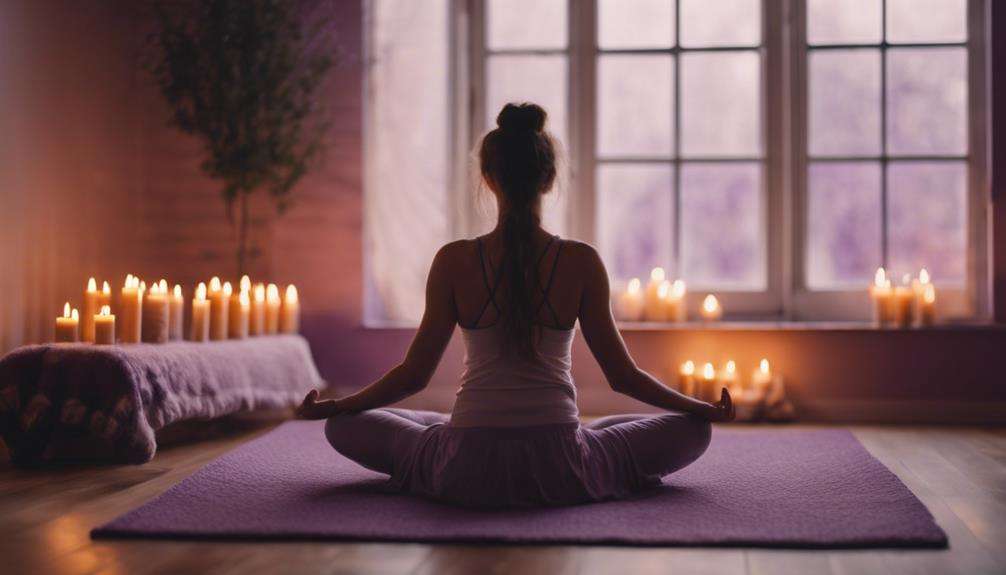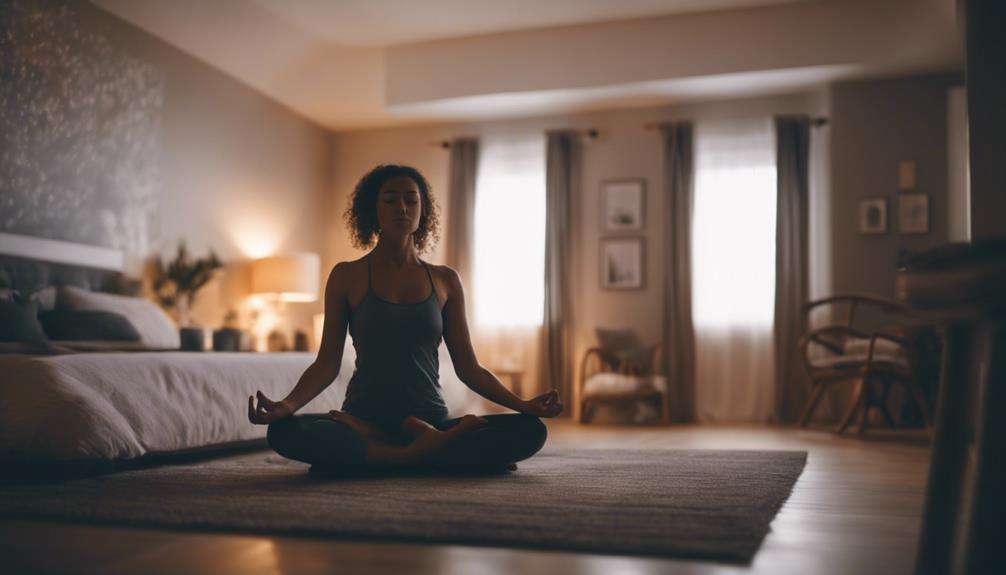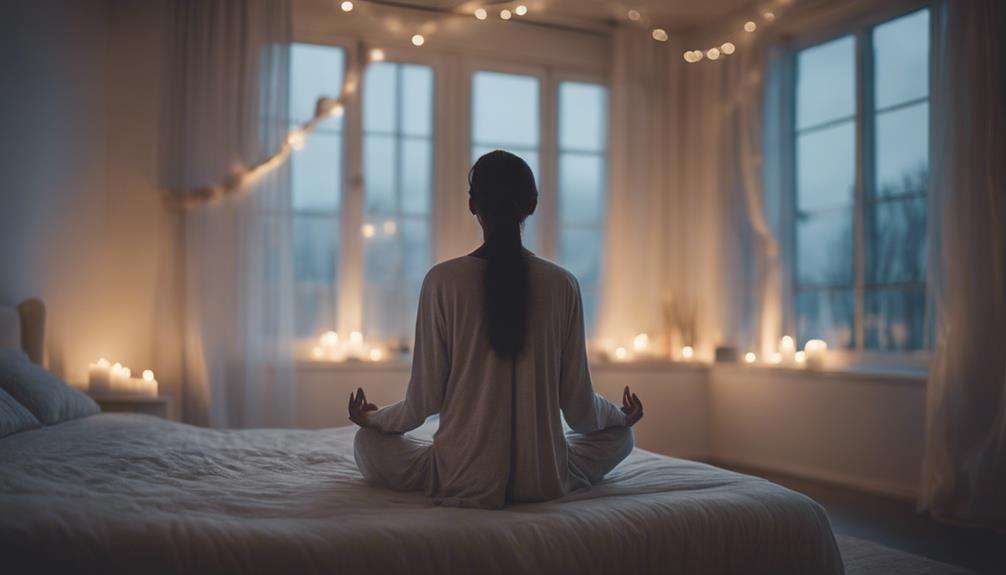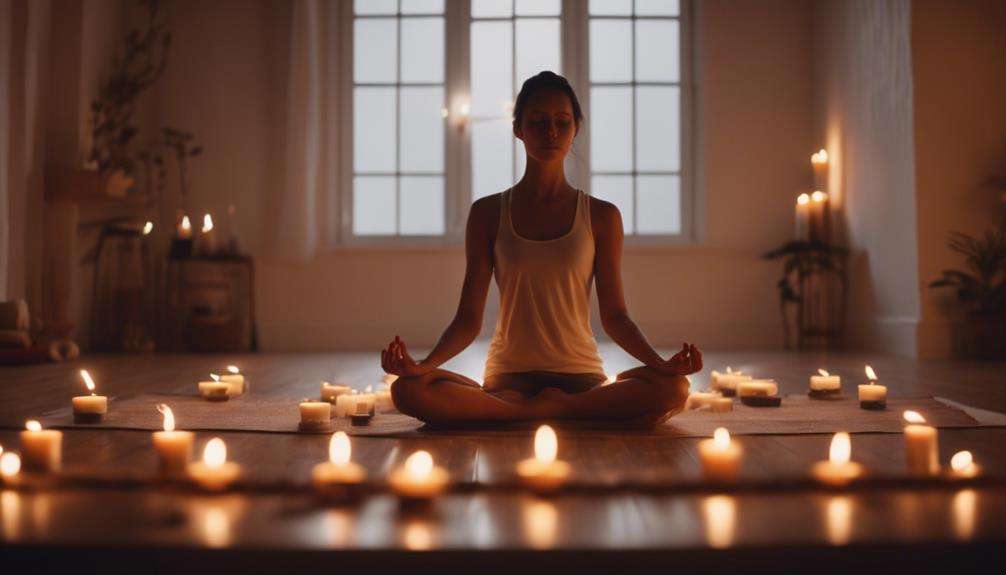Imagine a night where you effortlessly drift off to dreamland, waking up feeling refreshed and rejuvenated.
How can you achieve this elusive state of restful sleep without resorting to endless tossing and turning?
The answer might lie in the ancient practices of yoga and meditation. By tapping into these time-tested methods, you could unlock the key to a night of deep, uninterrupted sleep.
So, how exactly can these practices help you achieve better sleep quality?
Key Takeaways
- Yoga and meditation enhance sleep quality significantly.
- Combination reduces stress, promotes relaxation, and enhances mindfulness.
- Various yoga poses and meditation techniques aid in better sleep.
- Establishing a calming bedtime ritual with yoga and meditation promotes restful sleep.
Yoga's Impact on Sleep Quality
Wondering how yoga can truly enhance the quality of your sleep?
Yoga is a powerful tool that can significantly improve your sleep quality. By incorporating yoga into your routine, you can experience better relaxation, reduced stress levels, and an overall enhancement in your well-being, all of which contribute to more restful sleep. Specific types of yoga such as restorative, Yin, and Hatha have been particularly effective in promoting relaxation and reducing stress, leading to improved sleep outcomes.
Moreover, yoga has been shown to help manage sleep issues like insomnia and Restless Leg Syndrome (RLS), making it a versatile practice for individuals struggling with sleep disturbances. Research indicates that over 55% of yoga practitioners have reported enhanced sleep quality, highlighting the positive impact that yoga can have on your nightly rest.
Meditation Techniques for Better Sleep
To enhance the quality of your sleep, consider exploring various meditation techniques tailored to promote relaxation and improve overall well-being. Meditation techniques can play a significant role in improving your sleep quality. Here are four effective methods to consider:
- Mindfulness Meditation: Focus on present awareness, observe thoughts without judgment, and practice deep breathing to enhance consciousness and relaxation, fostering better sleep outcomes.
- Guided Meditation: Utilize recordings or a guide to lead you through meditation steps, aiding in visualization and relaxation, ultimately promoting better sleep quality.
- Body Scan Meditation: Increase awareness by focusing on different body parts, promoting relaxation through attention to physical sensations, and sequentially relaxing each part to enhance overall relaxation and sleep quality.
- Modulating Brain Mechanisms: Practices like mindfulness and body scan meditation have been shown to influence brain mechanisms that affect behavior and anxiety, contributing to improved sleep outcomes through enhanced relaxation and awareness.
Yoga Poses for Improved Sleep

Consider integrating specific yoga poses into your bedtime routine to enhance relaxation and promote improved sleep quality. Begin with calming poses like Child's Pose, Legs Up the Wall, or Corpse Pose to prepare your body for rest. These poses help release tension and quiet the mind, setting the stage for a peaceful night's sleep.
Gentle backbends such as Bridge Pose or Supported Fish Pose can help alleviate stress and promote relaxation, aiding in better sleep quality. Incorporating forward folds like Standing Forward Bend or Seated Forward Bend can calm the nervous system, bringing a sense of tranquility before bedtime.
Twists like Supine Spinal Twist or Seated Twist release tension in the spine and abdomen, further promoting relaxation for improved sleep. End your practice with grounding poses like Happy Baby Pose to signal your body to unwind and prepare for deep, restorative sleep.
Mindful Meditation for Sleep Benefits
Engage in mindful meditation to induce relaxation and reduce anxiety, fostering improved sleep quality. Mindfulness meditation promotes a state of deep relaxation, activating the body's natural relaxation response, which can help alleviate stress and anxiety before bedtime.
Here are four ways in which mindfulness meditation can benefit your sleep and overall health:
- Enhanced Subjective Sleep Quality: By practicing mindfulness meditation regularly, you may notice improvements in how restful and rejuvenating your sleep feels.
- Effective Stress Management: Mindfulness meditation equips you with tools to manage stress effectively, promoting a calmer mindset that can lead to better sleep.
- Improved Mental Outlook: Cultivating mindfulness can shift your mental outlook towards more positivity and tranquility, creating a conducive environment for restful sleep.
- Better Pain Management: Mindfulness techniques can help you become more aware of physical sensations, potentially aiding in managing pain that may disrupt your sleep patterns.
Integrating mindfulness meditation into your routine can't only enhance your sleep but also positively impact your overall health and well-being.
Integrating Yoga and Meditation for Sleep

Improve your sleep quality by seamlessly integrating yoga and meditation practices into your daily routine. By incorporating these techniques, you can effectively reduce stress, promote relaxation, and enhance mindfulness, all of which are essential for achieving better sleep patterns.
Yoga, with its focus on physical relaxation, and meditation, which calms the mind, create a powerful combination that can significantly impact your sleep quality. Research has shown that mindfulness meditation and specific yoga poses can even help alleviate symptoms of sleep disorders such as insomnia and restless leg syndrome.
Establishing a calming bedtime ritual that includes yoga and meditation before sleep can signal your body that it's time to prepare for restful sleep. Integrating these practices into your daily routine can lead to a more peaceful and rejuvenating night's rest.
Frequently Asked Questions
Does Yoga Improve Sleep Quality?
To improve sleep quality, focus on breathwork techniques, relaxation poses, and the mind-body connection. Reduce stress, maintain sleep hygiene, establish an evening routine, practice bedtime meditation, and consider yoga nidra. These practices can help with sleep disorders and insomnia relief.
Can Meditation Improve Sleep Quality?
To improve sleep quality, try mindfulness practice. Focus on deep breathing, relaxation techniques, and guided imagery. These methods aid insomnia treatment, stress reduction, and a peaceful mind. Explore body scan and progressive relaxation for better sleep.
Which Yoga Is Best for Sleep?
For better sleep, focus on restorative poses, deep breathing, and gentle stretches in your bedtime routine. Incorporate relaxation techniques, guided visualization, and calming rituals to enhance the mind-body connection. Create a peaceful sleep environment with nighttime yoga.
How Can I Improve My Sleep Quality?
To improve your sleep quality, focus on creating a soothing bedtime routine, practicing relaxation techniques, managing stress effectively, and enhancing your sleep environment. Incorporating mindfulness practices, breathing exercises, and cognitive therapy can also benefit your sleep hygiene.
Conclusion
Incorporating yoga and meditation into your daily routine can greatly improve your sleep quality.
While it may seem challenging to find the time or energy to practice these techniques, remember that even just a few minutes each day can make a significant difference in your overall well-being.
So take a deep breath, relax, and commit to taking care of yourself. Your mind and body will thank you for it.






